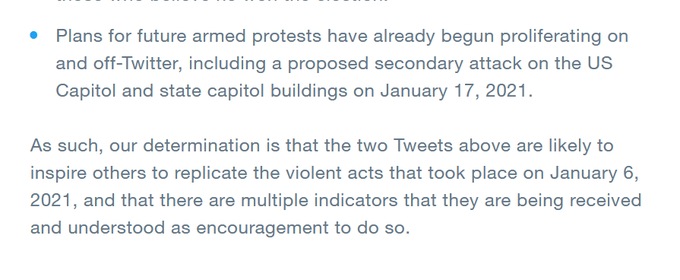I have mixed feelings about this.
- Trump's insurrection was on a different scale in the promotion of political violence. Is he sui generis?
- How do you get rules that work across full mainstream in polarised democracies, like US, France, India, UK etc? https://twitter.com/funder/status/1347688583197503493?s=19
- Trump's insurrection was on a different scale in the promotion of political violence. Is he sui generis?
- How do you get rules that work across full mainstream in polarised democracies, like US, France, India, UK etc? https://twitter.com/funder/status/1347688583197503493?s=19
Mixed views. Trump is an authoritarian more than a democrat (though he got elected) as we now saw from approach to electoral defeat and ceding power. There is a present danger of violence.
But should democracy be a threshold? Should you be on at all if a non-democratic regime?
But should democracy be a threshold? Should you be on at all if a non-democratic regime?
Mixed views: Trump is a racist, with a long history of racism.
There are a *lot* of much more overt white supremacists and fascists on this platform. Is there going to be a policy & capacity? Or just ad hoc decisions against some famous voices - while much worse people carry on
There are a *lot* of much more overt white supremacists and fascists on this platform. Is there going to be a policy & capacity? Or just ad hoc decisions against some famous voices - while much worse people carry on
This is a strong argument for applying the precautionary principle in January 2021 in the United States of America.
How it turns into a policy, that works, in America, and around the world - which has the capacity to work -will be a much more difficult thing to achieve
How it turns into a policy, that works, in America, and around the world - which has the capacity to work -will be a much more difficult thing to achieve
America is probably by some way the most polarised major democracy. Those with different views do not watch the same TV channels. They do not read the same newspapers. This is a big step towards not using the same websites. An more segregated democracy will probably emerge.
This is the World Leaders policy. It allows action in real time for cases of promoting violence. It is generally very vague. It is not clear to me it has been much used outside America - and would be interested to hear more about that https://blog.twitter.com/en_us/topics/company/2019/worldleaders2019.html
It is also interesting to see how rapidly the debate about "online harms" has shifted.
I would highlight that there have been 3 recent somewhat transformative events, which have shifted the boundaries a long way from where they were.
I would highlight that there have been 3 recent somewhat transformative events, which have shifted the boundaries a long way from where they were.
(1) Christchurch Massacre (March 2019) saw theories re online discourse and offline harm dramatically proven
Platforms did several things they had been refusing to do for a few years. Govts asked different questions, new threats to regulate.
[Why this event, not earlier ones?]
Platforms did several things they had been refusing to do for a few years. Govts asked different questions, new threats to regulate.
[Why this event, not earlier ones?]
July 2019 rules against "dehumanising" by faith (extended in March 2020, and then in Dec 2020 even to cover race too) were I think to a large extent a direct result of the Christchurch massacre changing the pressures, incentives to change https://www.theverge.com/2019/7/9/20687544/twitter-dehumanization-religious-groups-policy-rules-update
(2) US election cycle - esp Capitol Insurgency of 6th January 2020
Those "disputed claims" flags were new. (How effective were they? Not being able to RT if flagged probably was)
Insurrection seems to have promoted a watershed moment. Again *violence* changes
Those "disputed claims" flags were new. (How effective were they? Not being able to RT if flagged probably was)
Insurrection seems to have promoted a watershed moment. Again *violence* changes
(3) Senate results in Georgia, change US control
Counter-factual question
1) Trump's claims about fraud, rather than conceding
2) Democrats take the Senate
3) Insurrection and violence in Congress
Were all 3 necessary conditions, or would 2/3 have been enough on their own?
Counter-factual question
1) Trump's claims about fraud, rather than conceding
2) Democrats take the Senate
3) Insurrection and violence in Congress
Were all 3 necessary conditions, or would 2/3 have been enough on their own?
People take fairness, double standards claims & grievances v seriously.
Its right to apply the precautionary principle to risks of violence in the US - but I think it will cause a lot of problems in months/years ahead without a lot of capacity for a proper global policy v soon
Its right to apply the precautionary principle to risks of violence in the US - but I think it will cause a lot of problems in months/years ahead without a lot of capacity for a proper global policy v soon
Here is the framework I would consider using to try to develop a global risk register, focused on violence, genocide, war and democratic foundations. But capacity, capacity, capacity is likely to be a big issue here https://twitter.com/sundersays/status/1347692311317258250

 Read on Twitter
Read on Twitter